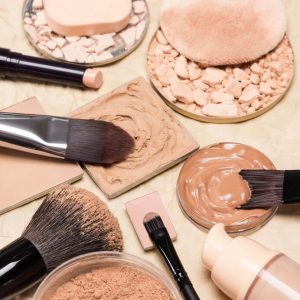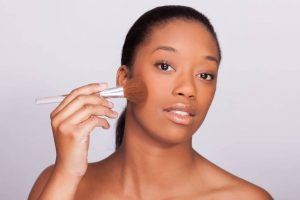Stumped between using a foundation brush or sponge? You aren’t alone — even professional makeup artists are divided on the topic. But before you decide if you’re firmly Team Brush or Team Sponge, consider that it’s possible you may need both to achieve that flawless foundation finish you’re after.
Learn more about the pros and cons of both makeup application tools, smart tips on perfecting your foundation, and hacks to help keep your makeup sponge and brush clean and well-maintained.
What Is Foundation?
 Foundation is considered your makeup base. It helps even out your skin — smoothing over pigmentation and skin imperfections, and helping to conceal any dark spots and blemishes. Depending on your skin type, the right foundation can help control excessive oiliness or give dull skin a brighter glow.1
Foundation is considered your makeup base. It helps even out your skin — smoothing over pigmentation and skin imperfections, and helping to conceal any dark spots and blemishes. Depending on your skin type, the right foundation can help control excessive oiliness or give dull skin a brighter glow.1
So, what’s not to like? Foundation makeup sometimes gets a bad rap for being too thick or too noticeable to be considered “natural” makeup. But luckily, more and more makeup brands are innovating their foundation formulas, creating various options for differing needs and finishes (like sheer for a subtle glow, or thick coverage to hide blemishes or acne) and preferences (liquid, powder, and lots of iterations in between).
Makeup Sponge Or Makeup Brush: Which Is Better For Liquid Foundation?

Ultimately, your choice of tool depends on your foundation formula. For liquid foundation, a beauty sponge may help you layer on the product more effectively for a more natural finish. By gently tapping or patting the liquid makeup on the surface of your skin using a blending sponge, you’re able to create an even, light finish that still looks like your skin (but better).2
Sponge 101: Beauty Blender Vs Silicone Sponges
If you’re already hunting for the perfect makeup sponge, you may have come across some of the more trendy versions: a beauty blender sponge and those clear-colored silicone sponges.

Beauty blender sponges are often made of foam. They tend to work best when damp, with foundation stippled or dabbed on the skin. What makes this type of sponge popular is how seamlessly and evenly it spreads and blends your makeup on your skin.
However, since it is a sponge-like material, the absorbent and porous material can cause you to waste a lot of product. Also, if not cleaned properly, the damp sponge can be a breeding ground for bacteria you definitely don’t want on your face.3
![]() This is where silicone sponges come in. Fans of this type of makeup sponge say the slippery, non-porous surface makes foundation application more precise and less wasteful. It’s also easier to clean and maintain — just wipe down or wash with antibacterial soap, and your silicone sponge should last you a long time.4
This is where silicone sponges come in. Fans of this type of makeup sponge say the slippery, non-porous surface makes foundation application more precise and less wasteful. It’s also easier to clean and maintain — just wipe down or wash with antibacterial soap, and your silicone sponge should last you a long time.4
Again, it comes down to personal preference — try both types of sponges (or have one of each handy) with your favorite liquid foundation and see which one gives you the finish and feel you’re after.
A Foundation Brush Is Great For Powder Foundation

If you’re a fan of powder foundation formulas, a makeup brush is your best friend. A fluffy brush with soft bristles is great at dispensing powder evenly and smoothly on the surface of your skin. The handled brush can also make blending and buffing a breeze.5
Now, this doesn’t mean that a brush and a liquid can’t ever go together. You can also use a brush with denser or stiffer bristles on creamy or wet foundation formulas. This is a good option for those with dry skin, because a damp sponge may accentuate or aggravate dryness in ways a dry, stiff brush loaded with the same makeup product wont.6
A Brush Is An Economical Choice
 Regardless of wet or powder formulation, a makeup brush might save you more money in the long run. A well-made foundation brush can withstand wear and tear (and multiple washings) far better than a sponge, which by nature should be tossed out and replaced often for hygienic purposes.
Regardless of wet or powder formulation, a makeup brush might save you more money in the long run. A well-made foundation brush can withstand wear and tear (and multiple washings) far better than a sponge, which by nature should be tossed out and replaced often for hygienic purposes.
You may also find yourself using less makeup product with a brush, since it doesn’t absorb your liquid makeup the way a sponge does. This means you won’t waste any of your pricey makeup — every drop goes on your face.7
Practice Makes Perfect, For Both Brushes And Sponges
You’d be hard-pressed to find a makeup artist who strictly uses one over the other. Brushes and sponges can work together when it comes to blending your foundation, blush, and contour seamlessly for a natural, looks-like-skin finish.
 For example, a stiff synthetic brush can apply liquid foundation precisely and evenly. Then you can use your small sponge for blending your base out for a sheer look. You can also use two different types of makeup brushes: a dense one for liquid foundation and a fluffy one for setting with loose powder.8
For example, a stiff synthetic brush can apply liquid foundation precisely and evenly. Then you can use your small sponge for blending your base out for a sheer look. You can also use two different types of makeup brushes: a dense one for liquid foundation and a fluffy one for setting with loose powder.8
Brush And Sponge Maintenance Tips
Since it’s in your best interest to have a set of both brushes and sponges on hand for your different foundations and makeup bases, you should definitely learn how to care for them the right way.
 Make sure to clean your brushes and reusable sponges with antibacterial soap at least once weekly, and thoroughly squeeze them to rid the bristles and foam from excess moisture. Get them as dry as possible to prevent bacteria buildup. Try to air-dry them without resting them on towels or another surface. While brushes are hardier and can last years if treated well, a makeup sponge needs to be replaced every few months.9
Make sure to clean your brushes and reusable sponges with antibacterial soap at least once weekly, and thoroughly squeeze them to rid the bristles and foam from excess moisture. Get them as dry as possible to prevent bacteria buildup. Try to air-dry them without resting them on towels or another surface. While brushes are hardier and can last years if treated well, a makeup sponge needs to be replaced every few months.9
Flawless Foundation Needs The Right Tools
With such a wide variety of makeup brushes and sponges across every price point, there’s no reason not to try your hand at perfecting your foundation application with any (or both) of these essential makeup tools. Just use a light hand, and take your time to blend, blend, blend for a flawless finish.
Learn More:
Different Types Of Makeup Brushes (And How To Use Them)
Summer Makeup Tips: Your Makeup Guide For Hot Weather
How To Apply Sunscreen With Makeup On: Smart Skin Care
Sources
1 https://www.popsugar.com/beauty/Why-You-Should-Wear-Foundation-43206959
2 https://www.byrdie.com/makeup-application-guide
3 https://www.refinery29.com/en-us/silicone-makeup-sponge-blender
4 https://www.refinery29.com/en-us/silicone-makeup-sponge-blender
5 https://www.instyle.com/beauty/makeup-brushes-vs-sponges
6 https://www.shefinds.com/collections/difference-between-makeup-sponge-foundation-brush/
7 https://www.shefinds.com/collections/difference-between-makeup-sponge-foundation-brush/
8 https://www.instyle.com/beauty/makeup-brushes-vs-sponges
9 https://www.allure.com/story/how-clean-are-your-makeup-brus
























































